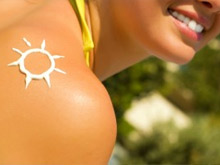Health Topics
-
Healthy Living
-
|
|
May 2010
|
| Hydrate Your Skin |
| Dr Anshul Warman |
| |
 |
Dry air sucks moisture from your skin. Mist your skin with hydrating mist sprays or pure, clean water to rehydrate throughout the day. Does hydration simply mean drinking lots of water or is there more to it? Our body loses two to three litres of water every day just from breathing, sweating and urinating! And if you tend to do other heavy activities you can lose up to two litres in an hour. Once the body has lost two percent of its normal water volume, it will show those mild dehydration symptoms. The most common symptom is thirst, which if you suppress long enough, will cause your skin to dry up. If you are adamant that you won’t quench your thirst, wrinkles can develop.
|
10 Ways to Stay Hydrated
Drink loads of water, at least eight glasses every day. The first step to hydrate your skin is to give it the things necessary to repair itself.Water helps the kidneys to filter toxins from your body. If you maintain a correct fluid level,your skin will look smoother and supple over a period of time.
But don’t keep on drinking water by the gallons. Excess water can wash off essential nutrients from your body.Carry a water bottle with you at all times so you can keep track of how much water you’ve consumed throughout the day.
Eat a healthy diet that includes plenty of antioxidants like fresh fruits and vegetables. These are known to prevent the oxidation that breaks down and ages the skin. Also, fruits and vegetables are high in fluid content and will provide your body with added moisture.
Take a few high quality vitamin supplements, specifically designed to give you healthy, hydrated skin. A good quality Omega 3 fish oil supplement and an all-in-one multivitamin would give your body the nutrients it needs to achieve optimum skin hydration. Check with your doctor before starting.
Get fresh air. Dry air pulls moisture from your skin. Mist your skin with hydrating mist sprays or pure, clean water to rehydrate throughout the day, especially if your day is spent in an air-conditioned office, which circulates dry air, or if you are a frequent flier, or live in a humid climate. A good quality humidifier could also help.
Wear sunscreen everyday. Exposure to the harmful effects of the sun can create wrinkles, as well as discoloration and age spots.Skin hydration cannot reverse the signs of aging skin but can assist you in hiding them. Soft and suppler skin is more effective in hiding the wrinkles, compared to dry skin.
Use a good quality skin moisturiser. Moisturisers help seal moisture into your skin so it doesn’t evaporate in the dry air. Use oil-free ones in summer.
Oily skin needs more hydration. Oil is used as a defensive shield to retain natural moisture. This means that oil glands will generate oil if they get a signal that the skin is getting dry. Those with oily skin should thus moisturise even more because their oil glands have a tendency to secrete more oil to make up for the lower levels of moisture.
Compromised skin needs much more hydration. The skin of newborns and young children, those in old age, and people with pre-existing skin diseases is compromised. To maintain their healthy functioning, due attention should be given to keeping it well hydrated, both internally and externally.
Limit the number of hot baths and showers you take. The harsh temperatures cause the skin to turn dry. The key is to apply a cream or ointment when your skin is still wet, to seal in the moisture.
Say no to smoking which ages skin prematurely. It causes your skin to lose its elasticity earlier, which makes it more difficult for it to hold onto moisture. Holding a cigarette in one hand and a moisturiser in another is a losing battle! Choose wisely. |
 |
Dr. Anshul Warman is Consultant Dermatologist and Cosmetologist at Apollo Hospitals, Ahmedabad |
|
|